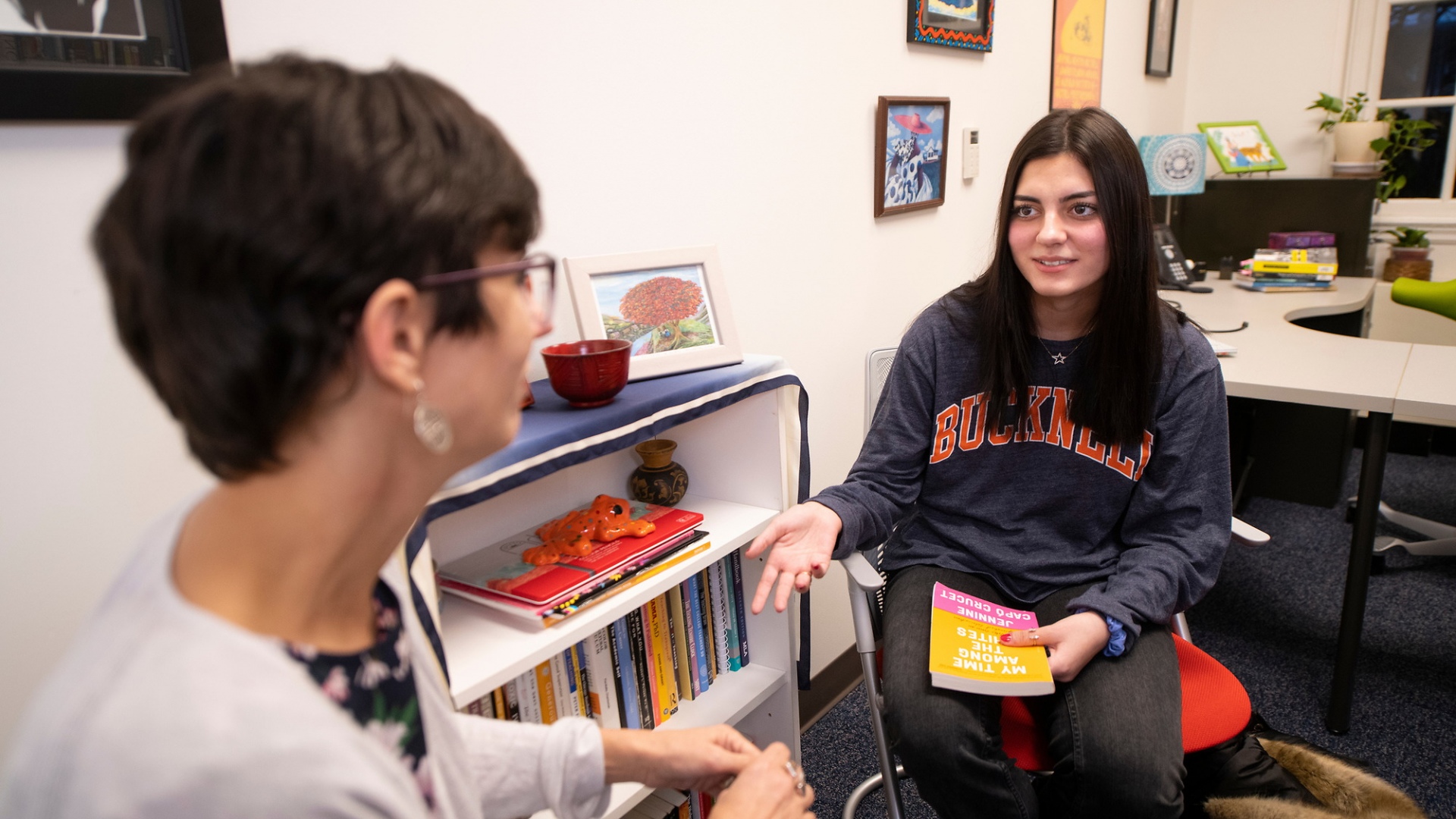[et_pb_section fb_built=”1″ _builder_version=”4.6.6″ _module_preset=”default”][et_pb_row _builder_version=”4.6.6″ _module_preset=”default”][et_pb_column type=”4_4″ _builder_version=”4.6.6″ _module_preset=”default”][et_pb_text _builder_version=”4.6.6″ _module_preset=”default” hover_enabled=”0″ sticky_enabled=”0″]
Esmely Muñoz ’20 found a sense of purpose doing volunteer work with Bucknell’s Office of Civic Engagement, “helping people because you want to help them, not just because you want to post it [on social media].” For Brishti Mandal ’20, it came in an eye-opening course in women’s & gender studies with Professor Erica Delsandro that “opened up a language I didn’t have before.” For Rebecca Rosenberg ’20, it was using her engineering education to develop assistive technologies for people with vision problems, like the one she’s had since birth.
As these three seniors discovered, empowering students to purposefully make a difference is a central focus of education at Bucknell, where students question the world around them and uncover ways to make it better through a variety of experiences inside and outside the classroom.
Helping to tie those experiences together — and, more importantly, helping students identify and access them more readily — is the focus of “Establishing an Ecosystem of Purpose,” a new research initiative at Bucknell supported by a $25,000 grant from the Kern Family Foundation.
“A big question in our mind is, ‘How do students find opportunities to discover their purpose, which they’re searching for whether they know it or not,’ ” says biomedical engineering professor Joseph Tranquillo, director of Bucknell’s Teaching & Learning Center and one of the grant’s principal investigators. “Because when they do arrive and feel it, there’s a recognition that this is a space where they can work on things they’ve wanted to work on for a long time. And then they get deeply immersed and deeply engaged.”
To find out how to engage students earlier in their college journey, Tranquillo and his fellow investigators — Professor Keith Buffinton, mechanical engineering, and Chaplain Kurt Nelson, director of religious & spiritual life — are diving into the undergraduate experience at Bucknell.
In focus groups throughout the summer and fall 2020 semester, they’ll speak with students across Bucknell’s many affinity groups — including majors from all three of Bucknell’s colleges; Division I athletes and non-athletes; international and domestic students; and many others — to ask about their most meaningful experiences, where they found purpose, and what might have held them back. Muñoz, Mandal and Rosenberg were part of the first interview group.
“We’re really starting with the student point of view and saying, ‘What have you experienced? What has it been like for you?’ ” Buffinton says.
The researchers believe students’ answers will shed light not only on the most effective programs and experiences at Bucknell but also on how students learn about these opportunities. Their end goal is to help students learn about and get involved in those activities as soon as they possibly can.
“One of the things we’ll have to wrestle with is that lack of opportunity is obviously not the problem,” says Nelson. “There are a million things that anyone can do here, and many of our students find their way and do some really purposeful exploration. But I also think some of our students get lost, so we want to build a culture that encourages people to do more self-reflection and supports purposeful activity.”
The researchers hope the results of the study, which lasts through June 2021, will not only make Bucknell an even more fertile environment for students to explore and discover what’s most meaningful in their lives, but will also enrich those opportunities at other colleges and universities.
The grant is part of a larger collaboration of 14 universities of varying sizes, both public and private. Called the Coalition for Life-transformative Education, the cohort aims to establish a blueprint for providing education that simultaneously transforms lives and prepares students for satisfying careers. It also seeks to improve student engagement and affirm the enduring value of a college education.
“The premise is really about creating a sense of well-being, identity and agency within students that helps them while they’re students — but also throughout their lives,” Buffinton says.
[/et_pb_text][/et_pb_column][/et_pb_row][/et_pb_section]


